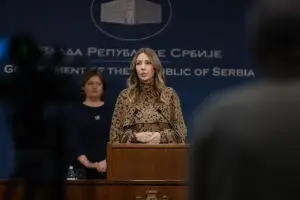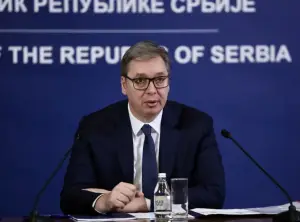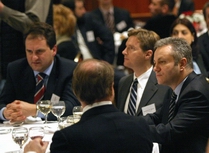- Serbia
Get to know Serbia
- Citizens
Culture and science
Health services
Pension and disability insurance
- Business
Employment
Economy
- Media
- Government
- Contact
Keep in touch
Contact form
Back
Keepin touch
Whether you have a question, comment, suggestion or any problem in the purview of the government, send us your message and we will try to respond as soon as possible. If your problem is not in our purview, we will forward your message to the relevant institution.
Q:
A:
Serbia to enter second phase of transition in late January 2006
Belgrade,
21 December 2005
Serbian Minister of Finance Mladjan Dinkic said today that Serbia will enter the second phase of transition in late January 2006, when the conclusion of the financial arrangement with the International Monetary Fund (IMF) is expected.
At a business lunch organised by the US Chamber of Commerce, Dinkic said that the most painful reforms are behind us and voiced satisfaction with the fact that 90 percent of economic goals have been achieved, except for maintaining the inflation rate within projected limits.
He said that inflation is a challenge that should be solved in 2006, even at the cost of somewhat lower economic growth, which will be six percent of GDP in 2005.
The Minister of Finance said that the next meeting with IMF representatives will be held in January or February next year, when future cooperation with this international financial institution will be defined in more detail.
Dinkic said that it is in Serbia's interest to conclude one more arrangement with the IMF, which will not necessarily entail new lending, because the current foreign currency reserves, which stand at $5.7 billion, are sufficient enough not to ask for new loans. He said that in next few years Serbia will repay all loans to the IMF.
Dinkic said that the best economic result achieved be the Serbian economy this year is a marked export growth of 35 percent, to which multinational companies present in Serbia largely contributed, first and foremost US Steel.
According to Dinkic, foreign direct investments, which are above the sum of $ 1.5 billion, will be enough in the upcoming year to continue the trend of accelerated growth of exports.
He explained that inflation this year was secondary in importance, since the major goal was to increase exports and reduce the deficit in the balance of payments.
Speaking on the basic goals of the Ministry of Finance for 2006, Dinkic gave the example of the adoption of the new law on financing local communities, which is expected to take place in the middle of the upcoming year. He explained that the law will improve the financial position of local self-governments, also making them more responsible.
He said that realisation of the budgetary surplus at the very beginning of 2006 will open up the possibility for reducing income tax, which will lessen labour costs and make Serbian economy and exports more competitive.
He said that it is expected that tax demands be reduced in the health systems, which will in the upcoming year totally change the method of financing.
Dinkic said that also in the upcoming year “something completely new” will happen in Serbia, and that is that Serbian companies such as “Dunav Osiguranje”, “Telekom Srbija”, “Komercijalna Banka” and some other private firms will begin to invest in neighbouring countries.
He said that inflation is a challenge that should be solved in 2006, even at the cost of somewhat lower economic growth, which will be six percent of GDP in 2005.
The Minister of Finance said that the next meeting with IMF representatives will be held in January or February next year, when future cooperation with this international financial institution will be defined in more detail.
Dinkic said that it is in Serbia's interest to conclude one more arrangement with the IMF, which will not necessarily entail new lending, because the current foreign currency reserves, which stand at $5.7 billion, are sufficient enough not to ask for new loans. He said that in next few years Serbia will repay all loans to the IMF.
Dinkic said that the best economic result achieved be the Serbian economy this year is a marked export growth of 35 percent, to which multinational companies present in Serbia largely contributed, first and foremost US Steel.
According to Dinkic, foreign direct investments, which are above the sum of $ 1.5 billion, will be enough in the upcoming year to continue the trend of accelerated growth of exports.
He explained that inflation this year was secondary in importance, since the major goal was to increase exports and reduce the deficit in the balance of payments.
Speaking on the basic goals of the Ministry of Finance for 2006, Dinkic gave the example of the adoption of the new law on financing local communities, which is expected to take place in the middle of the upcoming year. He explained that the law will improve the financial position of local self-governments, also making them more responsible.
He said that realisation of the budgetary surplus at the very beginning of 2006 will open up the possibility for reducing income tax, which will lessen labour costs and make Serbian economy and exports more competitive.
He said that it is expected that tax demands be reduced in the health systems, which will in the upcoming year totally change the method of financing.
Dinkic said that also in the upcoming year “something completely new” will happen in Serbia, and that is that Serbian companies such as “Dunav Osiguranje”, “Telekom Srbija”, “Komercijalna Banka” and some other private firms will begin to invest in neighbouring countries.
-
 Belgrade, 19 January 2026
Belgrade, 19 January 2026Deal reached on key provisions of NIS sale and purchase agreement
-
 Belgrade, 16 January 2026
Belgrade, 16 January 2026More than one-third of Growth Plan funds directed to energy sector
-
 Belgrade, 15 January 2026
Belgrade, 15 January 2026Goal to finalise NIS negotiations by end of week
-
 Belgrade, 23 December 2025
Belgrade, 23 December 2025Enhancing implementation of IPARD III programme
-
 Belgrade, 12 December 2025
Belgrade, 12 December 2025Construction of gas interconnector with North Macedonia by end-2027
-
 Belgrade, 8 December 2025
Belgrade, 8 December 2025Enormous public interest in registering illegal facilities
-
 Belgrade, 8 December 2025
Belgrade, 8 December 2025State doing everything to preserve stability of energy supplies
-
 Belgrade, 5 December 2025
Belgrade, 5 December 2025State doing everything to avoid shortage of oil derivatives
-
 Belgrade, 2 December 2025
Belgrade, 2 December 2025Serbia has not received positive decision from US over NIS
-
 Belgrade, 2 December 2025
Belgrade, 2 December 2025Spanish companies invited to invest in Serbian agriculture

